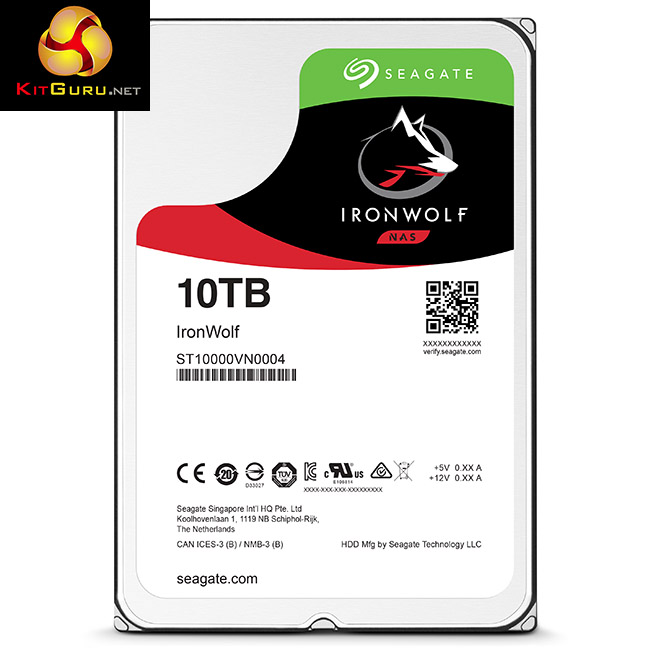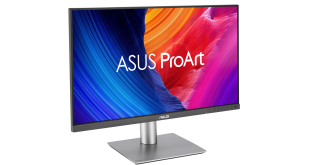
Seagate's latest behemoth of a hard drive is the 10TB flagship of the companies new Helium based IronWolf product line aimed at Home, SOHO and small business's using up to 8-bay NAS devices.
Later this year the IronWolf drives will be joined by the LoneWolf Pro range of products, which we assume will be aimed at the Enterprise market segment.

Currently, Seagate has a 10TB model in three product lines as part of the companies new Guardian series. There is a 10TB Barracuda Pro desktop drive, the 10TB SkyHawk drive which is aimed at surveillance setups and the NAS focused IronWolf.
Apart from the flagship drive, the IronWolf family has a comprehensive lineup of capacities; 1TB, 2TB,3TB,4TB, 6TB and 8TB. They all support NAS devices from 1 to 8 drive bays and Top Cover attached motors for better vibration tolerance.
All the drives feature AgileArray, Seagate's NAS optimisation technology which blends together drive balance, RAID error recovery and power optimisation. The three largest drives 6TB, 8TB and 10TB get extra protection through Dual-Plane Balance technology and Rotational Vibration (RV) sensors. RV sensors are usually only be found in Enterprise class drives and indeed the IronWolf drives with them are the first in this class of drives to have them installed. Both technologies aim to protect the drive against any damage caused by the vibration that is set up in the larger multi-bay NAS enclosures.
The IronWolf series also feature Multi-Tier Caching technology (MTC Technology), an architecture designed to maximize performance, particularly when it comes to random writes. The drives also feature multi-user technology that provides an 180TB/year user workload rate.
The quoted maximum sustained data rate for the 10TB IronWolf is 210MB/s and Seagate back the drive with a three-year warranty.
 KitGuru KitGuru.net – Tech News | Hardware News | Hardware Reviews | IOS | Mobile | Gaming | Graphics Cards
KitGuru KitGuru.net – Tech News | Hardware News | Hardware Reviews | IOS | Mobile | Gaming | Graphics Cards



Yet, compared to 2TB SSD, this is the cheaper alternative for 5x the storage. It’s not cheap, but it’s not too bad comperatively. I would love to see this drive for less than 200 euros. My current steam library is roughly 6TB +
You actually keep all your games of your steam library on your HDD? lol.
Yep, means, I don’t have to wait to download a game if I feel like playing it. The games I play most end up on my SSD for the time I use them then back to HDD. If something ever were to happen to steam for who knows what reason I could always crack my games.
You have a higher chance of losing your HDD than steam suddenly shutting down lol.
With a 180TB write endurance for 10 years? Seems kind of unlikely. Drives have a pretty long life expectancy specially if you use them more for storage rather than every day use.
I usually get paid in the span of 6-8 thousand dollars on monthly basis on the internet. For those of you who are prepared to finish simple computer-based task for 2-5 hrs daily from your home and make good benefit in the same time… Test this task UR1.CA/pm79t
i got 8 of these into a NAS in RAID 6, 60TB of storage. this one NAS replaced 3 older units running 2TB and 3TB drives. the space and power savings alone are worth it!
I am only afraid of one thing … it is one word, really, that I am worried about. The word is SEAGATE.
I take care of over 30 classrooms full of pc’s with consumer hdd’s. By far the highest failure rates we have ever seen are Western Digital Green drives. There are no drives on the consumer market LESS reliable than Western Dodgy greens. Backblaze’s most recent data shows this to be true with a failure rate over 10%.
But the relevant fact is that the chance of steam suddenly shutting down *and* him losing his HDD at the same time is smaller than just the chance of the steam suddenly shutting down.
I hope they keep avoiding SMR wherever possible.